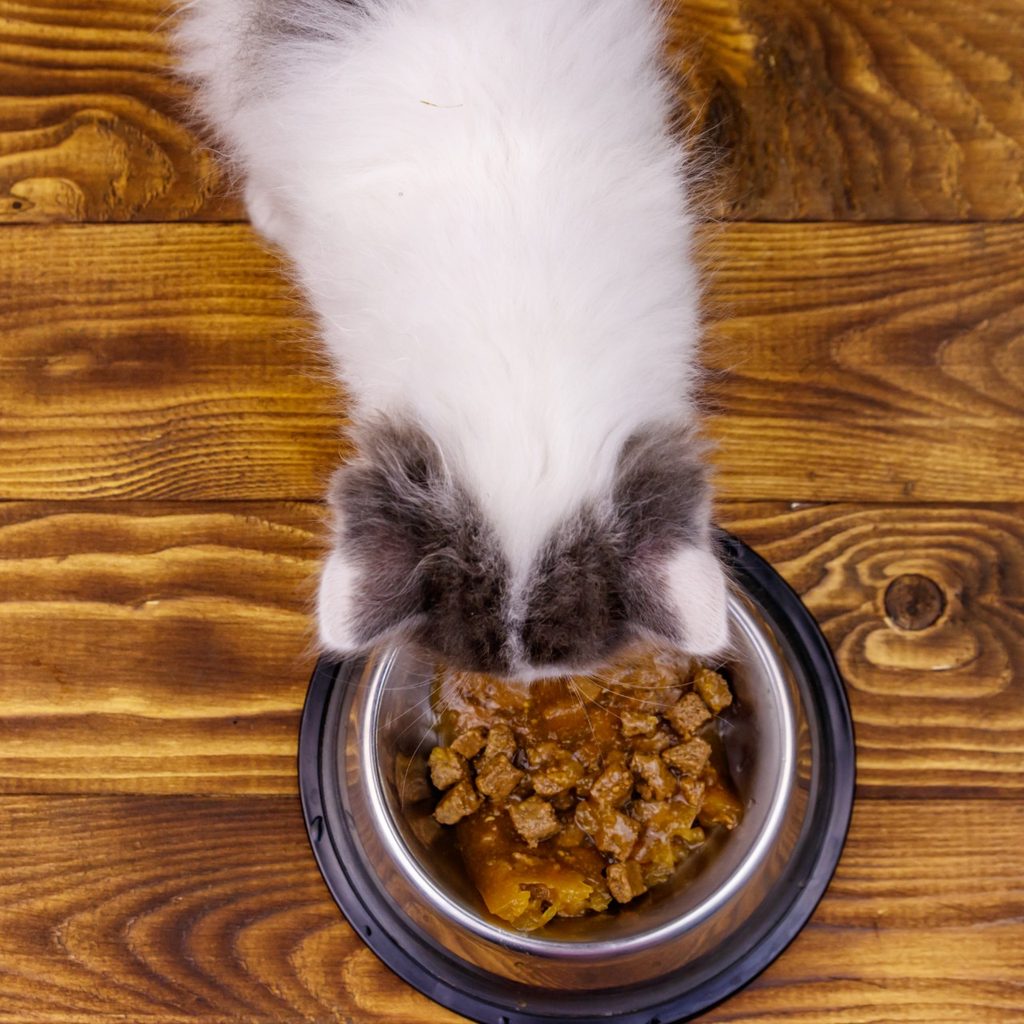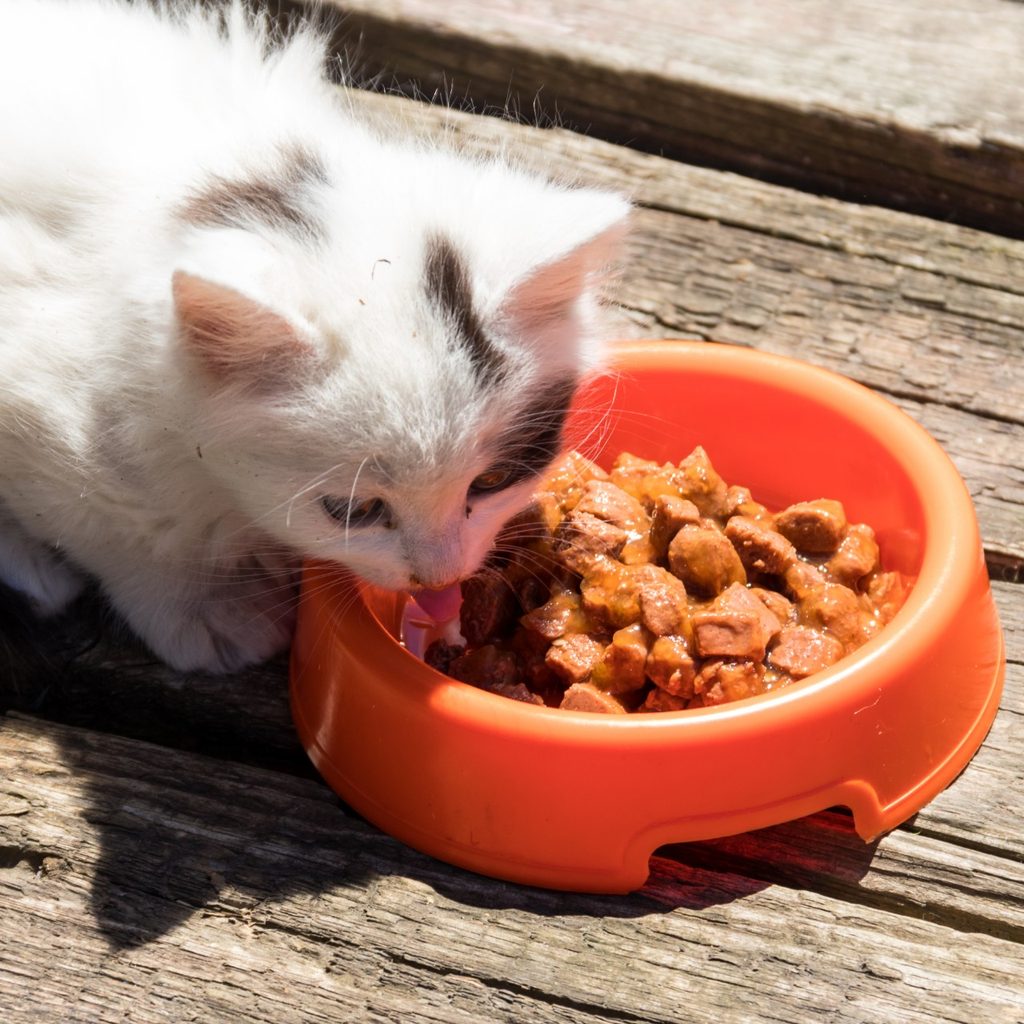The wild relatives of the house cat definitely don’t eat dry, processed food. They eat raw meat, and lots of it. So, should your indoor cat consume a similar diet? Is wet cat food better for cats than dry cat food? What are the healthiest kinds of soft food? What essential cat food ingredients must you look for? Get the answers to these questions and more below.

The importance of water
In nature, wild cats get the majority of their water from the meat they consume, meaning most wild cats drink little to no water. An indoor cat that eats dry food must, therefore, get all of their water from drinking. The average house cat that eats dry food drinks a few ounces of water per day. Wet cat food is a good alternative source of moisture for house cats. Soft cat food is usually about 75% water, while dry food is only 10% water.
Moreover, cats fed exclusively dry food have an overall lower water intake than those that eat wet food, even if fresh drinking water is available to them. An adequate amount of moisture in a cat’s diet may decrease the likelihood that they will form crystals in the urinary tract. Another study found that switching cats from dry to wet food decreases the incidence of cystitis, or inflammation of the bladder.
Dry food and dental health
Besides its effects on water retention and the urinary system, dry food may have an impact on a cat’s dental health. Some studies have shown that eating dry food provides a small benefit to dental health, while other studies have not made that connection. The abrasiveness of dry food may help break up plaque. However, some veterinarians believe that the high carbohydrate content and starchy coatings of dry foods may actually facilitate plaque formation. The high carbohydrate content of most dry foods means that cats fed dry food are also more prone to obesity and insulin resistance.
The best way to keep your cat’s teeth clean, though, as recommended by a majority of vets, is to regularly brush their teeth. The occasional tartar control chew or treat is not sufficient to clean your cat’s teeth, nor is a diet of exclusively dry food.
Comparing dry and wet cat food
A benefit of dry food, for the owner at least, is that giving it to your cat is very convenient. Unlike soft foods, dry foods do not harden when left out. Dry food is also sold in large quantities, as opposed to the individual serving containers that wet food is usually packaged in. Open cans of soft food should be refrigerated, but dry food can always be kept at room temperature. Dry food is also generally cheaper per serving than wet food.
Wet cat food is lower in calories per serving than dry cat food. This is why obese cats are sometimes put on a diet of soft food. In the United States, all cat foods must meet certain nutritional requirements, so both types contain all necessary nutrients. Soft food promotes the building of lean body mass, since it is high in protein. Wet cat food almost always has meat as its leading ingredient, unlike some dry foods that are laden with grains. Wild cats and domestic cats alike should primarily eat protein.
Flavor enhancers, artificial colors, fillers, preservatives, and other nutritionally unnecessary additives are more commonly found in dry foods than soft foods. As previously mentioned, soft cat foods keep your cat more hydrated than do dry foods. Note that wet cat food generally costs more than dry food per serving.
You’ve decided to feed your cat wet food — now what?

Wet cat foods are usually sold in single-serving pouches or cans, and may be sold on the shelf or in a refrigerator or freezer. Your primary concern regarding any commercial cat food should be its leading ingredients. These should be some type of meat. Most often, the meat will be beef, chicken, rabbit, or some kind of fish. However, more options like lamb- and duck-based foods are also available. If your cat has a sensitive digestive system, you may want to opt for foods that are made entirely of one meat as opposed to a mix of meats.
You can also choose to make your own cat food. There are entire cookbooks dedicated to cooking for cats. Some cats may prefer cooked foods, and you should cook most meats to kill any lingering bacteria. Raw chicken is safe for cats to eat, however. When made at home, cat food generally consists of meat, vegetables, and broth. This method allows you to best control exactly what your cat consumes.
Now that you’ve learned about the health benefits of soft cat food, hopefully you’ll want to at least supplement your cat’s diet with it. The flavor options are nearly endless, especially if you cook your own cat food! Make the switch from dry to wet today and see how much your cat enjoys their new diet.


